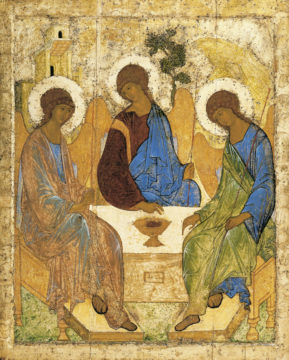As we celebrate the Solemnity of the Most Holy Trinity, please find a Franciscan Gospel reflection and questions written by Fr. Paul Gallagher, OFM for your prayer. They are edited by Franciscan Sister of Christian Charity Sister Anne Marie Lom and Joe Thiel. The excerpts from the Sunday readings are prepared by Joe Thiel. To read or download the complete pdf with excerpts for your prayer, please click here: Franciscan Gospel Reflections June 7 2020. Excerpts are from the Lectionary for Mass for Use in the Dioceses of the United States of America, second typical edition © 2001, 1998, 1997, 1986, 1970 Confraternity of Christian Doctrine, Inc., Washington, DC. Used with permission. All rights reserved. No portion of this text may be reproduced by any means without permission in writing from the copyright owner. Photo.
John 3:16-18
For God so loved the world that he gave his only Son, so that everyone who believes in him might not perish but might have eternal life. For God did not send his Son into the world to condemn the world, but that the world might be saved through him. Whoever believes in him will not be condemned, but whoever does not believe has already been condemned, because he has not believed in the name of the only Son of God.
Background:
The first verse (Jn 3:16) of the gospel is among the most familiar texts in the Christian Scriptures. Reginald Fuller, a well-respected scripture scholar, says that this one statement is “a succinct summary of the whole Gospel…”
John’s gospel was written much later than the other gospels. John’s community would have been familiar with those gospels. Therefore, John did not have to provide introductory information to the person of Jesus. He begins with John the Baptist testifying to the greatness of Jesus, and then moves directly to Jesus’ call of the first disciples. The second chapter of John’s gospel describes the wedding feast at Cana, and follows with Jesus expelling from the Temple those who were selling items needed by the pilgrims who desire to offer a sacrifice. Both events would have disturbed the peoples’ understanding of their relationship to God.
The third chapter of John’s gospel begins with Nicodemus, a leading Pharisee of the day, coming to Jesus at night to gain a clearer understanding of Jesus and his teaching. Nicodemus asks Jesus, “Rabbi, we know that you are a teacher who has come from God, for no one can do these signs that you are doing unless God is with him.” Jesus answered and said to him, “Amen, amen, I say to you, no one can see the kingdom of God without being born from above.” (John 3:2-3) Jesus’ response to Nicodemus uses a word that means both again and above, so that when Jesus tells him that one must be born “again” in order to enter the Kingdom of God, Nicodemus is not sure what he means. It is in the context of this conversation with Nicodemus that the present text appears in John’s gospel.
The text states that God gave his only Son to the world so that everyone who believes in him might have eternal life. In John’s gospel, “the world” is sometimes cast in a positive light, but more often it is cast in a negative light. The early Christians’ experience of the world changed drastically in those years when the texts that became the New Testament were being written. In the early years, the Christian movement was largely a segment of the Jewish community. Their daily life was shaped by the Jewish community and customs. But they were a group within their community that was convinced that Jesus was the long-awaited messiah. They lived by that conviction, and argued with their contemporaries, but still maintained their status in the community. As gentiles were converted and welcomed into the Christian community, tensions arose between the Jewish Christians and the non-Jewish Christian community. Some Jewish Christians rejected their new faith, resentments arose, and eventually the Christian community was expelled from the synagogues and a more hostile attitude toward the world emerged. This shift in attitude is also reflected in the New Testament and elsewhere in John’s Gospel.
Reflection Questions:
- Take a few minutes to write down how you both experience and think of the world, noting whether your experience is of a world that is more a blessing or more a source of evil.
- Can you recall scripture passages that speak of creation? What kind of impression do those passages have on you now?
- Can you contemplate what it might have been like for the Father to send the Son to be born into the world?
- Imagine for a moment that you are present when God the Father decides to send his son into the world. What is the Father’s mood, intention, and hope?
- Have there been periods in your life when it has been difficult to believe in the goodness of the world, creation, and the people around you? What happens to you when you choose to live out of that attitude?
- How is your life different when you live out of a basic reverence, trust, and sense of goodness in others?
- God so loved the world that… (How many times could you fill in this sentence?)
- The text seems to invite us to contemplate and enter the heart of God. Do you ever pray to know how God feels about you?
- Can you take some time to talk openly and honestly about how you feel about the world right now, how you would like to feel about the world, and what grace you need from God to approach the world as God approaches the world?




